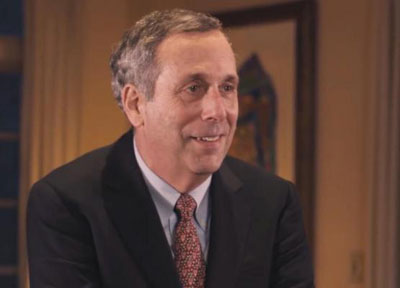Related Posts
Choosing leaders is no simple matter.
I read with interest last weekend an emailed announcement from William F. Lee, chair of the presidential search committee, about the selection of Lawrence Bacow as the next president of Harvard University. Bacow succeeds Drew Gilpin Faust, a president I have admired greatly for her scholarship, values and actions.
Having served on the Harvard T.H. Chan School of Public Health visiting committee and for other reasons, I pay more than passing attention to these announcements. They say a lot about what we value in higher education.

Lawrence Bacow will be Harvard University’s 29th president beginning July 1. Photo by Harvard University/YouTube via UPI.
The first thing I noticed (mentioned also in the story in The Harvard Gazette) is that the new president initially was a member of the search committee. Apparently, his colleagues eventually persuaded him to resign from the committee and become a candidate. I have been on several searches where something such as this has occurred, and it is difficult to manage well. Those who believe in conspiracies and premeditation tend to think the candidate planned it that way all along.
I’ve never seen that be the case. Members of search committees are human. As searches move forward, the process helps people clarify their preferences, expectations and understanding of candidates’ strengths and weaknesses. Committees often commence with the naïve view that there’s an external candidate who will sweep in and bring the vision and solutions everyone seeks. That undersells people already in the institution and often results in unfortunate decisions.
Sometimes, an external candidate is just the right person, but not always, especially in top institutions like the Gillings School, UNC-Chapel Hill and Harvard. Occasionally, allowing a search committee member to become a candidate is preferable to a failed search. I have no first-hand knowledge of this search. There’s a lot of soul searching in these cases, but here, the decision seems to have been right.
The choice of leaders sends a message about what we value.
What really struck me about the announcement – and it may, in part, represent superb public relations, but I doubt only that – is what it says about values and the state of the country today.
Bacow is described as the son of immigrants (his mother was a Holocaust survivor and his father a refugee) and a scholar of higher education who held senior leadership posts at MIT and then became president of Tufts University, which he is said to have led effectively. We need leaders who are proven in higher education, its own area of expertise. For a university president, knowing and understanding education is like knowing about products and processes in your industry if you’re CEO of a company. It’s not the only relevant expertise, but it can really help, especially today, with higher education under siege.
I was interested especially in Mr. Lee’s description of Bacow’s personal characteristics, his human qualities.
Larry’s extraordinary professional accomplishments take root in equally extraordinary human qualities — of integrity and collegiality, intelligence and compassion, humility and high standards, openness and warmth. He is someone who inspires trust in others, who motivates people to do their best work, who sees the exciting possibilities amid pressing challenges, who constantly reminds us to set our sights on something larger than ourselves. He radiates a deep conviction in the importance of what universities do, yet does so without a hint of self-importance. He is not just a remarkable leader, scholar, and educator, but a terrific human being.
It is an important statement about leaders and leadership that the chair of the search committee sought not only to extol Lawrence Bacow’s impeccable academic credentials, but also to laud his human ones. Leadership is not only about an impressive curriculum vitae; it also is about accomplishments of the heart and what one does every day to lift up others. Together, the package is vital to the future of the institution and communicates to different audiences about whom and what we value, and who and what count.
During this time, when immigrants to this country are threatened by our nation’s leaders, when lifting up others is too often bypassed for self-promotion, when greed replaces gratitude, when compassion is too often absent, and humility is sometimes perceived as weakness, we desperately need leaders who represent not just the best of academia and other fields, but the best of humanity. Humanity, after all, defines us.
Too often, these values are not the ones highlighted in leadership lessons, but they should be up there with financial prowess and change-management skills. By the way, Bacow also runs marathons! Based on my single experience of training for and completing the New York City Marathon many years ago, running a marathon teaches that persistence and taking the long view are important, and that putting one foot in front of the other every day is part of how one gets to the finish line. In a marathon, one’s biggest competitor is oneself – something Bacow is likely to know already.
Barbara
The views expressed in this blog are Barbara Rimer’s alone and do not represent the views and policies of The University of North Carolina or the Gillings School of Global Public Health.
